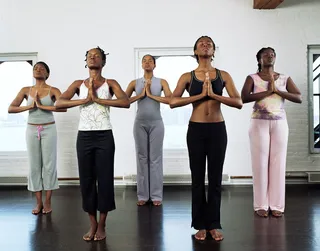Ladies, Make Your Health a Priority
The screenings that you need now.

1 / 12
Why Your Health Matters - Did you know it’s Women’s Health Week? This week raises awareness of the importance of ladies to make their health a priority. Read about the state of women’s health in Black America, which screenings you need and how to live a healthier life now. —Kellee Terrell (@kelleent) (Photo: Erik Isakson/Getty Images)
Photo By Erik Isakson/Getty Images

2 / 12
We Tend to Put Our Health Last - When it comes to women’s overall and reproductive health, we tend to put them on the back burner. Whether we are busy taking care of others, running the household or going to work, our health isn’t always the priority that it needs to be. It’s important to slow down and put ourselves first because our family is essentially as healthy as we are. (Photo: Jose Luis Pelaez Inc/Getty IMages)

3 / 12
How Obamacare Strengthens Women’s Overall Health - Not having access to quality health care is a dangerous thing. But thanks to Obamacare, millions of Black women are going to have affordable health care that makes preventive care co-pay free. This care covers a range of services from HIV testing, domestic violence counseling, prenatal care, well-woman visits and more. (Photo: Joe Raedle/Getty Images)

4 / 12
Obesity and You - It’s estimated that almost 75 percent of Black women are either overweight or obese. While no one is suggesting we be stick thin, having too much extra weight puts us at an increased risk for chronic illnesses such as heart disease, diabetes, high blood pressure and some cancers. Reconsider your diet and try easing into a workout routine. (Photo: Stockbyte/Getty Images)

5 / 12
Protect Your Ticker - Heart disease is the number-one killer among Black women — and we are twice as likely to die from it than white women. So make heart-healthy choices: eat better, cut down on salt and exercise most days of the week. Also talk to your doctor about where your heart health stands now and how to make improvements. (Photo: Rick Gershon/Getty Images)
ADVERTISEMENT

6 / 12
Think Pink! - Black women tend to be diagnosed with breast cancer at an earlier age and it tends to be more aggressive. Women between the ages of 20 and 39 should have a clinical breast exam every three years, while women over 40 should have a clinical exam every year. Since the 1990s, early detection has helped decrease the overall breast cancer mortality rate in women, though that decline has been slower in African-American women than in whites(Photo: Wil & Deni McIntyre/Getty Images)

7 / 12
Get a Pap Smear - HPV usually heals itself, but in Black women, it takes longer to clear up and hits us harder. This puts us at increased risk for developing cervical cancer and dying from it. So be proactive: Use condoms and get yearly pap smears to detect precancerous and cancerous cells. And if you are younger than 27, opt to getting the HPV vaccine. (Photo: Joe Raedle/Getty Images)

8 / 12
Know Your Status - Even though our numbers are down 23 percent, Black women still have the highest HIV diagnosis rates in the U.S. One way to fight AIDS is through annual testing at a clinic or your doctor’s office. Just remember, if you do not talk to your doc about testing for HIV, it may not happen. Speak up and demand to know your status.(Photo: Chip Somodevilla/Getty Images)

9 / 12
STDs Are No Joke - A past CDC study found that almost 50 percent of Black female teens has had one STD. With so many STDs showing no symptoms, we can have them and not even know. So get tested and tell your partner the same thing. Undiagnosed STDs can affect our fertility, reproductive health and make us more vulnerable to HIV infection. (Photo: Kevork Djansezian/Getty Images)

10 / 12
Get Your Sugar Under Control - More than four million of us suffer from diabetes — 15 percent of all African-Americans 20 and older. Diabetes can bring about kidney issues, renal failure and even amputations. Talk to your doctor about where you stand and how to make changes in your life to prevent the disease. (Photo: Mark Hatfield/Getty Images)
ADVERTISEMENT

11 / 12
Quit Them Cancer Sticks - While we tend to smoke less than white women, we are just as likely to have lung cancer and more likely to die from it. Smoking also increases our chance of cervical cancer, heart disease, gum disease and eye problems that can lead to blindness. Talk to your doctor about how to quit. (Photo: Daniel Barry/Getty Images)
